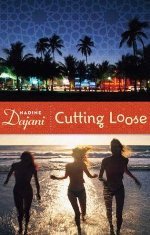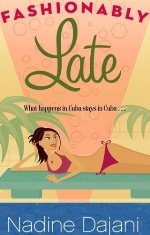Two posts in one day – I’m on a roll.
But this one couldn’t wait. I was really, really saddened last night when upon the blog of one of my favorite, most cherished chick lit (or any lit, really) writers ever were chapters from a novel-in-progress which edged a little too close for my comfort toward the negative Arab-man stereotype (the only way I’ve seen Arab women portrayed in literature is downtrodden and miserable, or saintly and sacrificing, or else forcing other women into submission because that’s all they’ve ever know… pretty one-dimensional stuff). I took this particularly hard because this is an author who’s inspired me very much with the way she’s called the American media on their racial stereotypes, and the way they’ve subverted meaningful debate by asking all the wrong, inflammatory, and stupid questions.
I won’t go too far with this, but there were some things about this Arab character that were somewhat anti-stereotypical in that at least he wasn’t a terrorist (which, I started worrying about when I saw he was being represented as filthy rich and sketchy). He was a well-educated though woefully ill-equipped-in-bed character who takes our beloved member-of-a-misrepresented-minority heroine to bed under dubious circumstances (which make us wonder for a second if she was drugged, or about-to-be drugged), bangs her rather unceremoniously, and then tells her that not only is he married, but to several women. It turns out our protagonist picked a polygamist, teeny-weeny penised Arab man - from a very fashionable Gulf country (as in accessible, modern, a staunch US ally, and a burgeoning tourist destination) – for her fling.
I thought we were done with the filthy-oil-rich-polygamist, (and Oh-so-80s) cliché. Replaced by the much more twenty-first century poverty-stricken-terrorist-wretch stereotype. This, from sub-par literature, I have no problem with. Everyone gets stereotyped against, from drug-dealing Latinos and thick-accented maids, to Noble Savage (or just plain savage) Native Americans. But this particular author had expended much energy on dispelling certain stereotypes in her body of work, so maybe that’s why I took the don’t-you-stereotype-me-but-I-can-do-it-all-I-want blow so much to heart.
Here’s the thing with Muslim polygamy, in case you were curious. It exists, so I wouldn’t hesitate to use it in one of my own novels, if I thought it served the plot, and – here’s the key point – if I presented it correctly. Otherwise it’s just perpetuating hateful these-people-are-wacko type stereotypes.
A note on explaining things: explaining is not excusing, or even forgiving. It’s just making an effort to get where something comes from, put it in context. The desert was a very polygamous place when Mohammed showed up, circa 600 AD. Mohammed himself took several wives in the name of forming alliances after his first wife – to whom he remained faithful – died. These were also times of much war and little charity. Widows and orphans were left to fend for themselves, as at that time, women, whether in the Middle East or Europe, had about as many rights as domestic animals did. Maybe less. Mohammed would have known all about that, being an orphan himself. So when he gained following and power, he put a cap on the number of wives a man could take (4), and gave those wives several key rights that it would take European women many, many, many hundreds more years to catch up to, namely: divorce, inheritance, property, dowry (payable TO the bride’s family as collateral in case of divorce – an alimony of sorts – not BY them).
Fast forward 1,400 years. One of the major tenants of Islam is that the Qur’an is the literal, written word of God (disclaimer: I believe ALL organized religions are bullshit. I’m just reporting on this as a socio-anthropological phenomenon). There is no room for doubt in Islam (unlike the Bible which is said to be the “inspired” word of God – we know there are several versions of the Bible, several interpretations, hence all the different denominations of Christianity. Not so with the Qur’an. The schism between Sunni and Shia Islam is political, not theological).
This makes it absolutely impossible for practicing Muslims to challenge their spiritual beliefs (which probably explains most of our problems right there). So no amendments or footnotes to the Qur’an to the effect of: “You know what, we thought about this four wives thing and it’s just way too fifth century…” It may as well have been written in stone.
With the advent of secularism in the Muslim world, what many Muslim countries have done in the past century is simply outlaw polygamy (e.g. Lebanon, Tunisia, among others). But, as you very well know, the custom is alive and well in countries that practice the Sharia’h (or Qur’anic) law verbatim (notably Saudi Arabia, the US’s most important ally in the Middle East). Nonetheless, polygamy, wherever it is practiced, is mainly limited to:
A) The insanely rich, like royalty and nobility – they tend to be very traditional, and can afford to dole out four identical Manolo Blahniks at a time;
B) The insanely poor, as nothing multiplied or divided by four is still nothing
C) The very old fashioned country folk who are still working the land (where have 4 times as many sons to tend the land, and 4 times more likelihood a couple will pull through infant mortality, is a plus)
The only instances of polygamy you will see amongst educated, modern, middle-class people are where a sleazy guy is “cheating” on his wife by taking a wife #2, equated in Arabic pop culture to taking a mistress. Neither wife would know the other exists, and should they find out, they’d treat the guy as though he’d cheated. No difference. Most of Arabic soap opera drama is based on this type of conflict, whereas you’d never see outright cheating on TV – that’s just a little too indecent for our religion-seeped souls.
My grandfather was, strictly-speaking, a polygamist but I didn’t know it until I was in my late teens. I just thought he was a confirmed bachelor after two failed attempts at marriage. His family chose my grandmother for him (illiterate 13 year-old Syrian woman from the countryside) when he was young himself. He wasn’t really interested in her seeing as he was educated and rapidly rising up the ranks as a businessman in booming Saudi Arabia. I don’t know if he had already separated from her when he met the woman who’d become his second wife, but for all intents and purposes, he separated from my grandmother, and was then with this other woman (whom he also separated from before I was born – hence why I thought he was unmarried). It never occurred to me that my grandparents never divorced, but I’m pretty sure that my poor, illiterate country-bumpkin grandmother would have infinitely preferred this fate over that of being a divorcee.
So there you have it – it is possible, I suppose, to pick up a thrice-married Arab man in a seedy tourist bar, as this author portrayed in her draft. But if he were royalty (scenario A), he’s more likely to be gallivanting around a casino in Monaco. Men from scenarios B and C are as likely to be found in said bar as the Earth is to be hit by a meteorite in the next three seconds. Oil-rich Emirs don’t grow on trees, despite what the Harlequins of yore told us. There are some 11,000-odd Saudi Princes and Princesses out there who squander their country’s natural resources at the expense of their citizens’ educations, infrastructure, and future. They deserve all the bad press they get. But what about the other 299,989,000 Arabs out there for whom polygamy is nothing more than a shadow of a long-gone past? If a liberal, anti-discrimination, deeply intelligent, outspoken media critic won’t attempt a nuanced picture of Arabs then I’m at my wits’ end.
I’m all for entertainment, and you can pick your bad guys out of any ethnicity you want. But it’s transcending stereotype through effective characterization that elevates your work to greatness. I thought this writer’s first few novels were the stuff of greatness, and I really hope that this ‘draft’ is just that – a raw draft – and that somehow the rest of the story makes up for this overplayed cliché.
Subscribe to:
Post Comments (Atom)




1 comment:
THanks for posting this...I have always been curious about Muslim polygamy..but have been too scared to ask.
I think it would be awesome to address this in your books one day...
Post a Comment